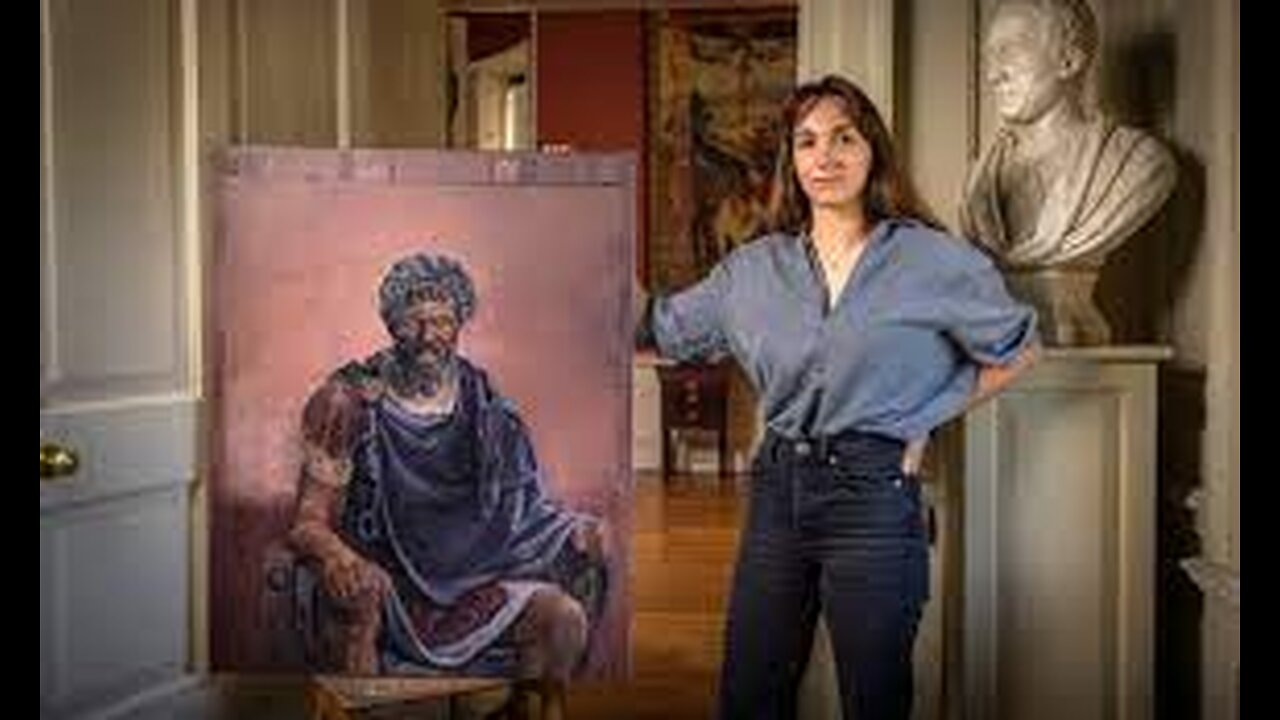Premium Only Content

Septimius Severus - The African Emperor Roman History Documentary Series
The Severan dynasty, sometimes called the Septimian dynasty,[1] was an Ancient Roman imperial dynasty that ruled the Roman Empire between 193 and 235, during the Roman imperial period. The dynasty was founded by the emperor Septimius Severus (r. 193–211), who rose to power after the Year of the Five Emperors as the victor of the civil war of 193–197, and his wife, Julia Domna. After the short reigns and assassinations of their two sons, Caracalla (r. 211–217) and Geta (r. 211), who succeeded their father in the government of the empire, Julia Domna's relatives themselves assumed power by raising Elagabalus (r. 218–222) and then Severus Alexander (r. 222–235) to the imperial office.
The dynasty's control over the empire was interrupted by the joint reigns of Macrinus (r. 217–218) and his son Diadumenian (r. 218). The dynasty's women, including Julia Domna, the mother of Caracalla and Geta, and her nieces Julia Soaemias and Julia Mamaea, the mothers respectively of Elagabalus and Severus Alexander, and their own mother, Julia Maesa, were all powerful augustae and instrumental in securing their sons' imperial positions.
Although Septimius Severus restored peace following the upheaval of the late 2nd century, the dynasty was disturbed by highly unstable family relationships and constant political turmoil,[2] which foreshadowed the imminent Crisis of the Third Century. In particular, the discord between Caracalla and Geta and the tension between Elagabalus and Severus Alexander added to the turmoil.[3] Septimius Severus (193–211)
Main article: Septimius Severus
The Libyan emperor Septimius Severus, the founder of the Severan dynasty
Lucius Septimius Severus was born in Leptis Magna, then in the Roman province of Africa Proconsularis and now in Libya, into a Libyan-punic family of equestrian rank.[4] He rose through military service to consular rank under the later emperors of the Antonine dynasty. He married Syrian noblewoman Julia Domna and had two children with her: Caracalla and Geta. Julia Domna also held a prominent political role in government during her husband's reign. Severus was proclaimed emperor in 193 by his legionaries in Noricum during the political unrest that followed the death of Commodus and secured sole rule over the empire in 197 after defeating his last rival, Clodius Albinus, at the Battle of Lugdunum.
Severus fought a successful war against the Parthians, campaigned with success against barbarian incursions in Roman Britain and rebuilt Hadrian's Wall. In Rome, his relations with the Senate were poor, but he was popular with the commoners and with his soldiers, whose salary he raised. Starting in 197, his praetorian prefect, Gaius Fulvius Plautianus, was growing in influence, but he would be executed in 205. One of Plautianus's successors was the jurist Papinian, a relative of Julia Domna.
Severus continued official persecution of Christians and Jews, both groups being alone in not assimilating their beliefs to the official syncretistic creed. [citation needed]
Severus died while campaigning in Britain.[5] He was succeeded by his sons Caracalla and Geta, whom he had elevated as co-emperors in the years preceding his death. The growing hostility between the brothers was initially buffered by Julia Domna's mediation.
Caracalla (198–217)
Caracalla and Geta, Lawrence Alma-Tadema (1907)
Main article: Caracalla
The eldest son of Severus, he was born Lucius Septimius Bassianus in Lugdunum, Gaul. "Caracalla" was a nickname referring to the Gallic hooded tunic that he habitually wore even while he slept. Years before his father's death, Caracalla was proclaimed co-augustus with his father, and later his younger brother Geta. Conflict between the two culminated in the assassination of the latter less than a year after their father's death. Reigning alone, Caracalla was noted for lavish bribes to the legionaries and unprecedented cruelty by authorising numerous assassinations of perceived enemies and rivals. Caracalla was also indifferent to the full responsibilities of the empire during his reign and handed them over to his mother, Julia Domna, who took part in a provincial tour and military campaign and accompanied her son. He campaigned with indifferent success against the Alamanni. The Baths of Caracalla in Rome are the most enduring monument of his rule. He was assassinated en route to a campaign against the Parthians by a member of the Praetorian Guard.
Geta (209–211)
Main article: Publius Septimius Geta
Dynastic aureus of Septimius Severus, minted in 202. The reverse feature the portraits of Geta (right), Julia Domna (centre), and Caracalla (left).[6]
The younger son of Septimius Severus, Geta was made co-augustus alongside his father and older brother Caracalla. Unlike the much more successful joint reign of Marcus Aurelius (r. 161–180) and his brother Lucius Verus (r. 161–169) the previous century, relations were hostile between the two Severan brothers after their father's death. Geta was assassinated in their mother's apartments by order of Caracalla, who then ruled as sole emperor.
-
 10:29:53
10:29:53
CHRONOS LEGACY MEGALITH
14 hours agoBattleship Leviathan's Fear by Craig Martelle BOOK 6
1651 -
 5:30
5:30
Michael Knowles
18 hours agoCBS Cancels Stephen Colbert’s Late Show
31.5K36 -
 11:49
11:49
Nikko Ortiz
17 hours agoCrazy Instant Karma Clips
22.8K17 -
 LIVE
LIVE
MrR4ger
2 hours agoSOLO DOLO QUESTING - ESCAPE FROM TARKOV PVE IS FUN??? *NEW R4GER RIFFS MONDAY!!**
155 watching -
 LIVE
LIVE
Anvilight
5 hours agoWorld of Warcraft | Returning to Scotland AND Azeroth! | Scotsman Unites The American Clans
96 watching -
 16:21
16:21
Actual Justice Warrior
23 hours agoSuper Mayor Replacement SCAMS Voters
24K15 -
 LIVE
LIVE
Sacred Sage
3 hours ago $0.46 earnedClair Obscur: Expedition 33: How MASSIVE Is This Map?!
89 watching -
 LIVE
LIVE
The Goon Room
4 hours agoConan Exiles Restart
83 watching -
 10:17
10:17
Dr Disrespect
3 days agoIt's Time To Get Serious
164K24 -
 2:04:24
2:04:24
Side Scrollers Podcast
22 hours agoColbert CANCELLED, Donkey Kong Bananza “Disappointing”, $100k in Pokémon STOLEN | Side Scrollers
25.8K8